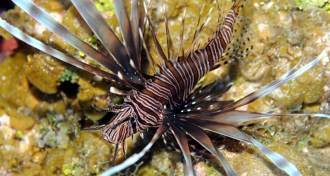Life
Sign up for our newsletter
We summarize the week's scientific breakthroughs every Thursday.
-
 Life
LifeWeevils evolved nut-and-screw joint
Insects invented hardware way back in dinosaur days.
By Susan Milius -
 Life
LifeLife
The perils of insect enslavement, bats’ hairy flight and crustacean-inspired optics in this week’s news.
By Science News -
 Life
LifeAlzheimer’s plaques due to purging flaw
A gene controls the clearance of a protein that accumulates in the brains of people with the condition.
-
 Animals
AnimalsLionfish no match for big groupers
Despite its invasive success, the lionfish can't withstand grouper appetites.
By Janet Raloff -
 Life
LifeTasmanian devil genomes offer some hope, few answers
While clues to combating the infectious cancer that's threatening the species remain elusive, the completion of two genetic blueprints reveals a low but stable genetic diversity.
-
 Life
LifeNew gene therapy fixes mistakes
For the first time scientists have repaired a damaged gene in a living mouse.
-
 Life
LifeGenes & Cells
Self-sufficient pancreatic cells, tingly spinal cells and vitamin D for gum disease in this week’s news.
By Science News -
 Life
LifeBlue light used to treat diabetes
Illumination triggers control of blood sugar in mice implanted with engineered human cells.
-

-
 Paleontology
PaleontologyBig dinosaurs kept their cool
Body temperature of long-gone beasts resembled that of mammals, study of fossil teeth suggests.
-
 Life
LifeLife
Ultrasonic ribbits, saving dead trees and fishy retribution in this week’s news.
By Science News -
 Life
LifeMulticellular life arises in a test tube
A yeast experiment recapitulates a major early milestone in the history of life.
By Susan Milius